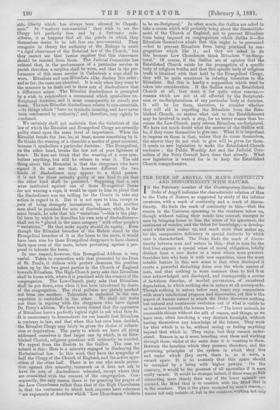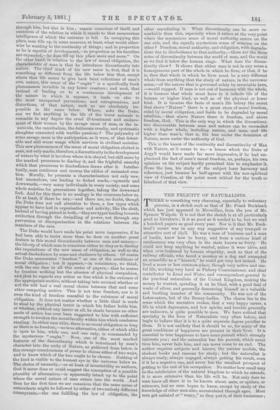THE DUKE OF ARGYLL ON MAN'S CONTINUITY AND DISCONTINUITY WITH
NATURE.
IN the February number of the Contemporary Review, the I Duke of Argyll indicates the characteristic relation of Man to the Unity of Nature, as suggested by study of the inferior creatures, with a mark of continuity and a mark of discon- tinuity. He finds the mark of continuity in this,—that the reason in the Universe, operating in the creatures below us, though without taking their minds into counsel, emerges in man by bringing home to him the sense of his ignorance, the sentiment of wonder, and the thirst for knowledge,—a develop- ment which soon makes up, and much more than makes up, for the comparative deficiency in special instincts by which man is characterised. The Duke finds the mark of discon- tinuity between man and nature in this,—that in man for the first time appears a special sense of moral obligation, totally distinct from a new desire or a want whose mere pressure furnishes him who feels it with new capacities, since the most notable feature in this new sense is that when disobeyed it exerts a powerful disturbing force over the whole nature of man, and that nothing is more common than to find it at once acknowledged and disobeyed, and consequently a source of factitious disorder, of morbid perversions, of unnatural degradation, to which nothing else in nature at all corresponds. Though nothing in nature below man bears any comparison with man's intellectual progress and discoveries, yet this is the aspect of human nature in which the Duke discovers nothing but natural and continuous evolution out of what is visible to us in nature beneath the human level :—" The lower animals do reasonable things without the gift of reason, and things, as we have seen, often involving a very distinct foresight, without having themselves any knowledge of the future. They work for that which is to be, without seeing or feeling anything beyond that which is. They enjoy, but they cannot under- stand. Reason is, as it were, brooding over them and working through them, whilst at the same time it is wanting in them. Between the faculties which they possess, therefore, and the governing principles of the system in which they live and under which they serve, there is, as it were, a vacant space. It is no anomaly that this space should be occupied by a being with higher powers. On the contrary, it would be the greatest of all anomalies if it were really vacant. It would be strange, indeed, if there were no link connecting more closely than any of the lower animals can connect, the Mind that is in creation with the Mind that is in the creature. This is the place occupied by man's reason,— reason not only outside of, but in the creature, working not only through him, but also in him ; reason conscious of itself, and conscious of the relation in which it stands to that measureless intelligence of which the universe is full. In occupying this place, man fills up, in some measure, at least, what would other- wise be wanting to the continuity of things ; and in proportion as he is capable of development,—in proportion as his faculties are expanded,—he does fill up this place more and more." On the other hand, in relation to the law of moral obligation, the characteristic of man is that he introduces discontinuity into nature. The chief mark of his new sense is, first, that it is something so different from the life below him that, except where that life seems to give back faint reflections of man's own nature, this sense of the " ought " is a specifically fresh phenomenon invisible in any lower creature ; and next, that instead of leading on to a continuous development of the nature in which it appears, it leads on also to the most unexpected perversions, and retrogressions, and distortions, of that nature, such as are absolutely im- possible in the races below. Where, asks the Duke, can we find anything in the life of the lower animals to resemble in any degree the cruel ill-treatment and enslave- ment of their women by the savage races of men, or the in- anticide, the cannibalism, the deliberate cruelty, and systematic slaughter connected with warlike passions P The polyandry of some savage races is the anticipation, as it were, of that detest- able and still worse usage which survives in civilised societies. This new phenomenon of the sense of moral obligation elicited in man, not only marks, therefore, a discontinuity in the development of nature by what it involves where it is obeyed, but still more by the marked proneness to disobey it, and the frightful anarchy which that proneness to disobedience draws after it. Intellec- tually, man continues and crowns the edifice of animated crea- tion. Morally, he presents a characterisation not only new, but anomalous, one leading to forked roads,—upwards and downwards,—very many individuals in every society, and some whole societies for generations together, taking the downward fork. And for this there is no analogy in the creatures below tie.
Or at least, if there be any,—and there are, no doubt, though the Duke does not call attention to them, a few types which appear to have lost in organisation and activity, like the sloth, instead of having gained in both,—they are types tending towards extinction through the dwindling of power, not through any perversion or disorganisation in the relations between the members of the race.
The Duke would have made his point more impressive, if he had been able to insist more than he does on another great feature in this moral discontinuity between man and nature,— the liberty of which man is conscious either to obey or to disobey the requisitions of the new sense of obligation, as well as the actual disobedience by some and obedience by others. Of course the Duke enumerates " freedom " as one of the conditions of moral obligation ; but it appears,—in consistency, we think, with the one flaw in all this series of papers,—that he means by freedom nothing but the absence of physical compulsion, and ,that he regards any action as free which is the outcome of the appropriate motive, without taking into account whether or not the will had a real moral choice between that and some other competing motive. This is not true freedom, nor is it even the kind of freedom essential to the existence of moral obligation. It does not matter whether a little thief is made to steal by the physical terror in which his father holds him, or whether, without any terror at all, he steals because no other mode of action has ever been suggested to him with sufficient strength to awaken the moral faculty within him which condemns stealing. In either case alike, there is no moral obligation so long i as there is no freedom,—no true alternative, either of which alike is open to him, while one, and one only, is commanded by the mysterious " ought." Now, one of the most marked features of the discontinuity which is introduced by man's character into the unity of Nature, as gathered from below, is this strange consciousness of power to choose either of two ways, and to know which of the two ought to be chosen. Nothing of the kind is visible to the keenest eye in the universe below us. The choice of necessity,—or at least of invariability so uniform, that it never does or could suggest the conception of a possible plurality of alternative,—is apparently intact up to the point where the moral nature of man enters into the world. And then for the first time we are conscious that the same series of antecedents might be followed by either of two entirely different eonsequents,—the one fulfilling the law of obligation, the other repudiating it. What discontinuity can be more re- markable than this, especially when it enters at the very point where the mysterious sense of moral authority enters on the one side, and the equally mysterious sense of remorse on the other P Freedom, moral authority, and obligation, with degrada- tions due to disobedience to that authority,—these are the three notes of discontinuity between the world of man, and the world as we find it below the human stage. What does the discon- tinuity show P It shows that either man is not in any sense a homogeneous part of the whole in which he lives, or that, if he is, then that whole in which he lives must be a very different whole from anything that the study of nature, in the narrower sense,—of the nature that is governed solely by invariable laws, —would suggest. If man is not out of harmony with the whole, it is because that whole must have in it infinite life of the human or higher kind, as well as of the physical or lower kind. It is because the facts of man's life betray the secret that above "Nature" there is a great store of moral freedom, ruled by moral obligation, and liable to be degraded by moral rebellion,—that above Nature there is freedom, and above freedom, God. This is the only way in which the discontinui- ties discoverable between man and nature can be reconciled with a higher whole, including nature, and man, and life higher than man's, that is, life less under the dominion of Nature, more under the authority of God.
This is the lesson of the continuity and discontinuity of Man with Nature, as it seems to us,—a lesson which the Duke of Argyll would have made far more impressive, if he had em- phasized the fact of man's moral freedom, as, perhaps, his own opinions on the subject hardly permitted him to emphasize it. None the less, his study of the subject loses harmony and coherence, just because he half-agrees with the non-spiritual view of Creation, at the point most critical for the truth or falsehood of that view.



































 Previous page
Previous page